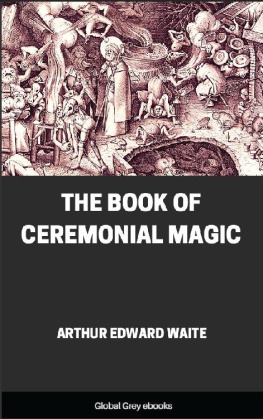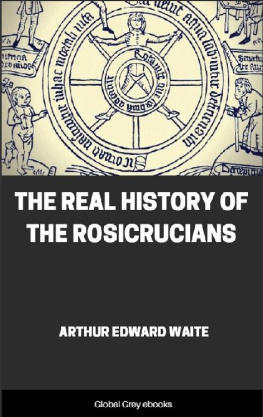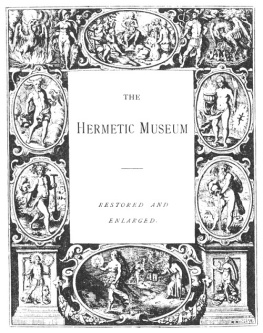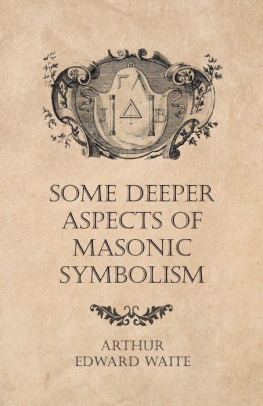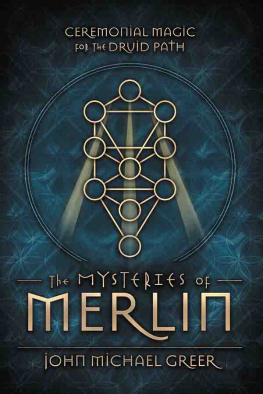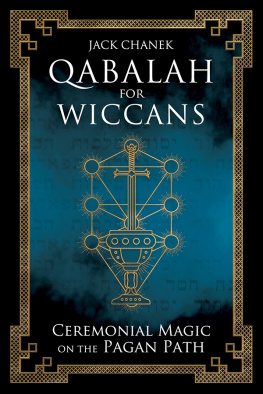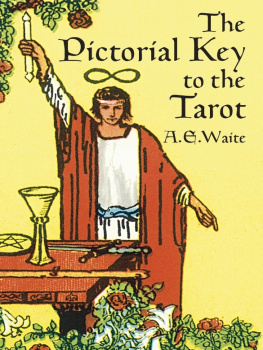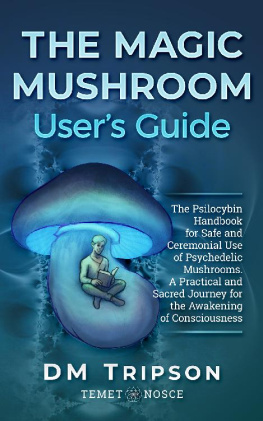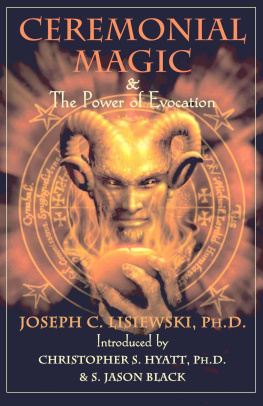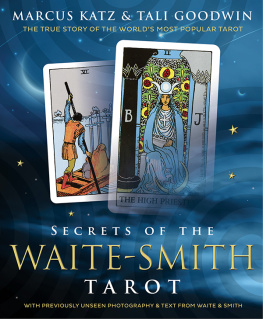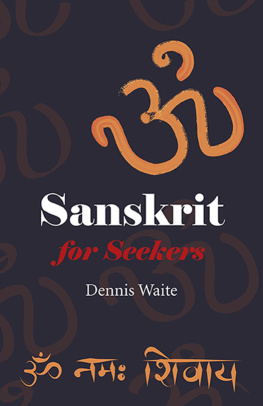Arthur Edward Waite - The Book of Ceremonial Magic
Here you can read online Arthur Edward Waite - The Book of Ceremonial Magic full text of the book (entire story) in english for free. Download pdf and epub, get meaning, cover and reviews about this ebook. year: 2018, publisher: Global Grey ebooks, genre: Science. Description of the work, (preface) as well as reviews are available. Best literature library LitArk.com created for fans of good reading and offers a wide selection of genres:
Romance novel
Science fiction
Adventure
Detective
Science
History
Home and family
Prose
Art
Politics
Computer
Non-fiction
Religion
Business
Children
Humor
Choose a favorite category and find really read worthwhile books. Enjoy immersion in the world of imagination, feel the emotions of the characters or learn something new for yourself, make an fascinating discovery.
- Book:The Book of Ceremonial Magic
- Author:
- Publisher:Global Grey ebooks
- Genre:
- Year:2018
- Rating:5 / 5
- Favourites:Add to favourites
- Your mark:
- 100
- 1
- 2
- 3
- 4
- 5
The Book of Ceremonial Magic: summary, description and annotation
We offer to read an annotation, description, summary or preface (depends on what the author of the book "The Book of Ceremonial Magic" wrote himself). If you haven't found the necessary information about the book — write in the comments, we will try to find it.
The Book of Ceremonial Magic — read online for free the complete book (whole text) full work
Below is the text of the book, divided by pages. System saving the place of the last page read, allows you to conveniently read the book "The Book of Ceremonial Magic" online for free, without having to search again every time where you left off. Put a bookmark, and you can go to the page where you finished reading at any time.
Font size:
Interval:
Bookmark:
THE BOOK OF CEREMONIAL MAGIC
THE SECRET TRADITION IN GOTIA, INCLUDING THE RITES AND MYSTERIES OF GOTIC THEURGY, SORCERY AND INFERNAL NECROMANCY
BY
ARTHUR EDWARD WAITE
"Alii damones malos virtute divinorum nominum adjuratos, advocare solent, atque hc est illa Necromanti species qu dicitur malefica: vel in Theurgiam, qu quasi bonis Angelis, divinoque numine regitur (ut nonnulli putant) cum sapissime tamen sub Dei, et Angelorum nominibus malis Dmnoun illusionibus peragitur."--ROBERT FLUDD.
1913
The Book of Ceremonial Magic by Arthur Edward Waite.
This edition was created and published by Global Grey
GlobalGrey 2018

globalgreyebooks.com
THE art which is called Gotic, being that of incantation, of sorcery, fascination and of the illusions and impostures connected therewith, has come somewhat arbitrarily to signify the last issue in diabolism of the more catholic and general art which is termed Practical Magic. The latter designation implies that there is a Magic on the theoretical side, or, as it may be, a philosophy of the subject, and this again is of two kinds: in modern days it has embodied various attempts to provide an explanation, a working hypothesis, for alleged phenomena of the past; of old it came forward with the accent of authority and carrying the warrants of a peculiar and secret knowledge; it taught rather than explained. Behind this, in virtue of a specific assumption, there stood the source of such authority, the school or schools that issued, so to speak, the certificates of title which the records of the expounding master are supposed to shew that he possessed. Herein resided presumably that Higher Magic which justified the original meaning of the term Magic; this was the science of wisdom, and of that wisdom which was the issue of experience and knowledge particular to sacred sanctuaries in the years of the Magi. In this manner a remote and abstract magnificence has been allocated to the practical work; but between this aspect as we know it otherwise and that dream as it has been dilated in the forms of its expression there is the kind of relation which subsists between renown and its non-fulfilment. If Magic in its proper and original meaning be synonymous with wisdom; if that wisdom, by virtue of this assumption which I have mentioned, were something inconceivably great, it is of certitude that it had no causal connection with the congeries of arts and processes which are understood by Practical Magic. That there was, as there still is, a science of the old sanctuaries, I am certain as a mystic; that this science issued in that experience which imparts wisdom I am also certain; but it did not correspond to any of the arts and processes to which I refer here, nor to anything which can be received by the mind as the result of their exaltation. The consideration of a possibility thus already condemned is therefore ruled out of the inquiry which I have attempted in the present work. I have also ruled out, as it will be seen, the distinctions which have subsisted between the good and evil side of the arts and processes, not that it does not exist on the bare surface, but because the two aspects dissolve into one another and belong one to another in the root that is common to both. The actual question before us is after what manner, if any, magical procedure draws anything from secret tradition in the past, and so enters into the general subject of such tradition, whether in Christian or anterior times. It would and could only be of tradition on its worthless side, and it will not exalt a subject which the records of centuries have shewn to be incapable of being raised; it will, however, let us know where we are. On the face of the question a tradition of all kinds of rubbish is very likely to have been handed down from antiquity, and in respect of occultism, the last drift and scattermeal has passed into the Grimoires, Keys of Solomon and other rituals innumerable by which Art Magic has passed into written record.
As this book represents, under a new title and with many additions, a work which was issued originally in 1898, I have accepted the opportunity to indicate its position in respect of far more important works embodying my construction of the Secret Tradition in Christian Times. I have secured this object--which after all is clear and simple--not by a regrettable comparison of what I have written there with that which appears in the present place, but by shewing in a brief introduction the proper sense in which phenomenal occultism and all its arts indifferently connect with the tradition of the mystics: they are the path of illusion by which the psychic nature of man enters that other path which goes down into the abyss. The book in its present revision remains of necessity a presentation of old texts by the way of digest; I have added some new sections that in this department it may be rendered more representative, and if a touch of fantasy, which is not wholly apart from seriousness, will be pardoned here at the inception, the work itself is now an appendix to the introductory thesis--the textual, historical and other evidence by which it is supported.
In the year 1889 an expositor of the more arid and unprofitable side of Kabalistic doctrine edited in English a text of Ceremonial Magic, entitled Clavicula Salomonis, or, the Key of Solomon the King. In an introduction prefixed to the work he stated that he saw no reason to doubt, and therefore presumably accepted, the tradition of its authorship, which in respect of the critical sense may be taken to summarise his qualifications for a mentor stultorum. It should be added, as an additional light, that he undertook his translation more especially for the use of occult students, that is to say, for those persons who believe in the efficacy of magical rites and may, as an illustration of their faith, desire to put them in practice. With this exception, the large body of literature which treats of Theurgic Ceremonial in its various branches has remained inaccessible to the generality of readers, in rare printed books and rarer manuscripts, in both cases mostly in foreign languages. There is probably a considerable class outside occult students to whom a systematic account of magical procedure may be not unwelcome, perhaps mainly as a curiosity of old-world credulity, but also as a contribution of some value to certain side issues of historical research; these, however, an edition for occult students would deter rather than attract. In the present work several interests have been as far as possible considered. The subject is approached from the bibliographical and critical standpoints, and all sources of information which many years of inquiry have made known to the writer have been consulted to render it complete. At the same time, seeing that there is a section of readers who will not disdain to be classed as professed occultists, whatever my view of their dedications, I am dealing with texts over which their interest may be held to exercise a certain primary jurisdiction, and I have therefore studied their requirements in two important respects, which will not, as I believe, be a source of offence to merely historical students. They have been studied, firstly, by the observance of strict technical exactitude; the ceremonial produced in this book is absolutely faithful to the originals, and removes all necessity of having recourse to the originals before determining any doubtful point of magical procedure in the past. For convenience of reference--if I may venture to make the modest bid for recognition on the part of such a circle--it is indeed superior to the originals, because it has been put systematically, whereas they often exceed understanding owing to the errors of transcribers, the misreadings of printers, the loose methods of early translators, and seemingly, it must be added, the confused minds of the first compilers, "Solomon" himself not excepted. The innumerable offices of vain observance which constitute Ceremonial Magic, as it is presented in books, will therefore be found substantially intact by those who concern themselves with such observance.
Next pageFont size:
Interval:
Bookmark:
Similar books «The Book of Ceremonial Magic»
Look at similar books to The Book of Ceremonial Magic. We have selected literature similar in name and meaning in the hope of providing readers with more options to find new, interesting, not yet read works.
Discussion, reviews of the book The Book of Ceremonial Magic and just readers' own opinions. Leave your comments, write what you think about the work, its meaning or the main characters. Specify what exactly you liked and what you didn't like, and why you think so.

